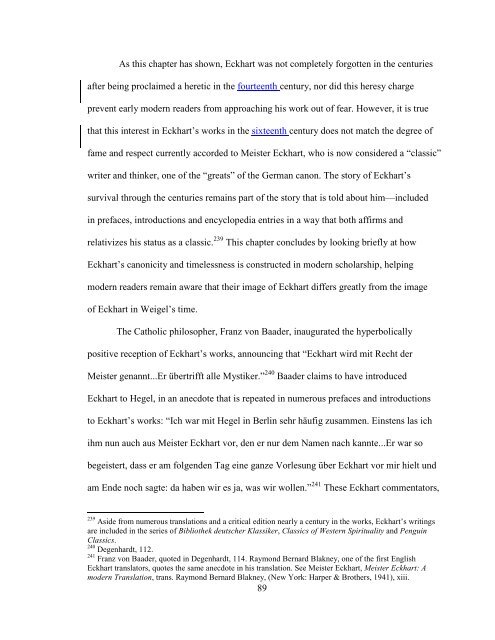the mystical theology of valentin weigel - DataSpace at Princeton ...
the mystical theology of valentin weigel - DataSpace at Princeton ...
the mystical theology of valentin weigel - DataSpace at Princeton ...
You also want an ePaper? Increase the reach of your titles
YUMPU automatically turns print PDFs into web optimized ePapers that Google loves.
As this chapter has shown, Eckhart was not completely forgotten in <strong>the</strong> centuries<br />
after being proclaimed a heretic in <strong>the</strong> fourteenth century, nor did this heresy charge<br />
prevent early modern readers from approaching his work out <strong>of</strong> fear. However, it is true<br />
th<strong>at</strong> this interest in Eckhart’s works in <strong>the</strong> sixteenth century does not m<strong>at</strong>ch <strong>the</strong> degree <strong>of</strong><br />
fame and respect currently accorded to Meister Eckhart, who is now considered a “classic”<br />
writer and thinker, one <strong>of</strong> <strong>the</strong> “gre<strong>at</strong>s” <strong>of</strong> <strong>the</strong> German canon. The story <strong>of</strong> Eckhart’s<br />
survival through <strong>the</strong> centuries remains part <strong>of</strong> <strong>the</strong> story th<strong>at</strong> is told about him—included<br />
in prefaces, introductions and encyclopedia entries in a way th<strong>at</strong> both affirms and<br />
rel<strong>at</strong>ivizes his st<strong>at</strong>us as a classic. 239 This chapter concludes by looking briefly <strong>at</strong> how<br />
Eckhart’s canonicity and timelessness is constructed in modern scholarship, helping<br />
modern readers remain aware th<strong>at</strong> <strong>the</strong>ir image <strong>of</strong> Eckhart differs gre<strong>at</strong>ly from <strong>the</strong> image<br />
<strong>of</strong> Eckhart in Weigel’s time.<br />
The C<strong>at</strong>holic philosopher, Franz von Baader, inaugur<strong>at</strong>ed <strong>the</strong> hyperbolically<br />
positive reception <strong>of</strong> Eckhart’s works, announcing th<strong>at</strong> “Eckhart wird mit Recht der<br />
Meister genannt...Er übertrifft alle Mystiker.” 240 Baader claims to have introduced<br />
Eckhart to Hegel, in an anecdote th<strong>at</strong> is repe<strong>at</strong>ed in numerous prefaces and introductions<br />
to Eckhart’s works: “Ich war mit Hegel in Berlin sehr häufig zusammen. Einstens las ich<br />
ihm nun auch aus Meister Eckhart vor, den er nur dem Namen nach kannte...Er war so<br />
begeistert, dass er am folgenden Tag eine ganze Vorlesung über Eckhart vor mir hielt und<br />
am Ende noch sagte: da haben wir es ja, was wir wollen.” 241 These Eckhart comment<strong>at</strong>ors,<br />
239 Aside from numerous transl<strong>at</strong>ions and a critical edition nearly a century in <strong>the</strong> works, Eckhart’s writings<br />
are included in <strong>the</strong> series <strong>of</strong> Biblio<strong>the</strong>k deutscher Klassiker, Classics <strong>of</strong> Western Spirituality and Penguin<br />
Classics.<br />
240 Degenhardt, 112.<br />
241 Franz von Baader, quoted in Degenhardt, 114. Raymond Bernard Blakney, one <strong>of</strong> <strong>the</strong> first English<br />
Eckhart transl<strong>at</strong>ors, quotes <strong>the</strong> same anecdote in his transl<strong>at</strong>ion. See Meister Eckhart, Meister Eckhart: A<br />
modern Transl<strong>at</strong>ion, trans. Raymond Bernard Blakney, (New York: Harper & Bro<strong>the</strong>rs, 1941), xiii.<br />
89
















